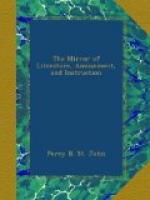W.H.
P.S. Since I sent you an account of Picton’s Monument at Carmarthen, it has been altered. The statue, bas-reliefs, and ornaments of the Picton Monument, have been bronzed by the direction of Mr. Nash, on his late visit to this town. Elegant as this column was before, the effect of the bronze, and a few other alterations, have so improved its appearance, as to make it seem a different structure. Nothing now remains to complete the outside but the names of the different actions in which Sir T. Picton was engaged during his honourable career. These are to be placed in bronzed letters on the base. A Latin inscription, already prepared, together with the arms and a bust of Picton, will ornament the inside of the building. It certainly is a monument worthy of the hero to whose memory it has been erected, and of the country by which it has been raised.
* * * * *
THE SKETCH BOOK.
* * * * *
WATERLOO, THE DAY AFTER THE BATTLE.
By an eye witness.
[For the following very interesting Narrative, our acknowledgments are due to the United Service Journal,—a work which has just started with the year, and to which, in the “customary” phrase, we wish “many happy returns.”]
The summer of 1815 found me at Brussels. The town was then crowded to excess—it seemed a city of splendour; the bright and varied uniforms of so many different nations, mingled with the gay dresses of female beauty in the Park, and the Allee Verte was thronged with superb horses and brilliant equipages. The tables d’hote resounded with a confusion of tongues which might have rivalled the Tower of Babel, and the shops actually glittered with showy toys hung out to tempt money from the pockets of the English, whom the Flemings seemed to consider as walking bags of gold. Balls and plays, routs and dinners were the only topics of conversation; and though some occasional rumours were spread that the French had made an incursion within the lines, and carried off a few head of cattle, the tales were too vague to excite the least alarm. I was then lodging with a Madame Tissand, on the Place du Sablon, and I occasionally chatted with my hostess on the critical posture of affairs. Every Frenchwoman




